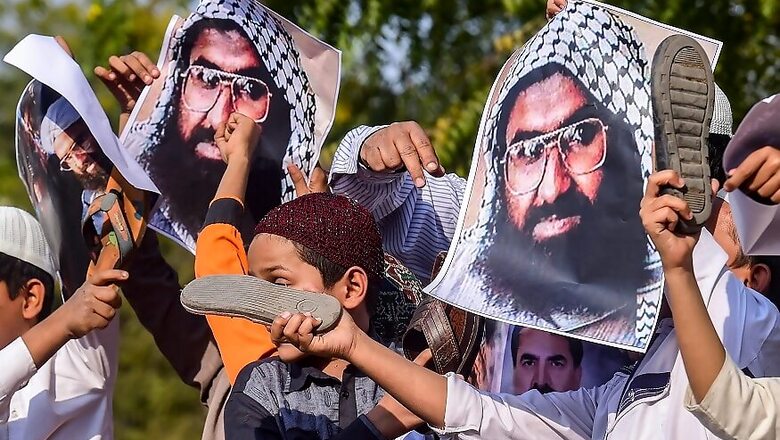
views
In an age of extremes, of hyperbole, and of tall promises, a headline announcing that getting Pakistani terrorist Masood Azhar sanctioned by the UN’s 1267 Committee is a ‘big’ diplomatic win for India should not be surprising. It would, however, be worrying if Government of India officials or responsible political leaders were to also parrot this line.
India’s Permanent Representative to the UN was calm in his tweet declaring that Azhar had been designated a terrorist. Finance Minister Arun Jaitley, however, at a press conference on behalf of the ruling BJP could not resist taking potshots at the opposition Congress, criticising it for asking, “what is the big deal?” and went on to call the listing ‘badi kootnitik vijay’ (big diplomatic victory).
Announcing the UN decision at a political rally, Prime Minister Narendra Modi went one better than his Cabinet colleague, declaring the Azhar listing ‘bahut badi kootnitik vijay’ (a very big diplomatic victory). However, he too, was soon making all manner of accusations against his predecessor, making obvious once again the intimate connection between foreign policy and its domestic uses.
The question for us here is if the Chinese have exploited this connection in India – the timing, after all, of China’s finally lifting its technical hold on sanctioning Azhar in the middle of a general elections in India can only look good for the BJP.
It should be remembered that the Communist Party of China (CPC) holds regular interactions with other political parties around the world, including both ruling and opposition parties. Senior CPC officials have regularly visited India and interacted with the Congress and the BJP, among others as well as hosted leaders from these parties in China. As a party that is dedicated to preserving itself in power, the CPC is just as capable of understanding the exigencies of political campaigns in a democracy like India. Most Chinese analysts appear to believe that Modi is likely to return to power – thus, support for the Azhar listing is probably seen as winning China some points with Modi. Even if Modi were not to make it back to power, surely no party could complain about Beijing finally agreeing to the listing.
Still, the most important reason for China eventually falling in line probably has to do with the threat by the US, UK and France to take the matter to an open discussion at the UN Security Council where China would have ended up looking a lot worse than in the closed-door meetings of the 1267 Committee.
There is also now a growing belief that New Delhi has decided in some way to participate in China’s Belt and Road Initiative that it has so strenuously opposed for several years. It has been specifically suggested that unlike in 2017 when India issued a statement opposing the BRI on the eve of the 1st BRI Forum in Beijing, New Delhi did not do so on the eve of the 2nd Forum in April this year. However, this latter silence might not be so significant. What is important is that there are substantial reasons for India to participate in the BRI, even if with caution, for its own economic and geopolitical interests.
More realistically, could New Delhi also have threatened to stop the ‘hand-in-hand’ anti-terror exercises with the Chinese? These exercises with India have helped China create a false equivalence between itself and India as a victim of terrorism and the ending of these exercises would have been a major loss of propaganda value for Beijing.
Finally, to return to India’s diplomatic ‘victory’, the key point for Indians to note is that China made India wait 10 years before finally agreeing to list Azhar as a terrorist. This, when it should have been a fairly straightforward affair especially when compared to agreeing to India’s membership of the Nuclear Suppliers Group (NSG), where the Chinese can at least claim the excuse of India not being a signatory to the Nuclear Non-proliferation Treaty.
Instead, the Chinese forced India to expend time and energy over an issue that at the end of the day changes relatively little on the ground in substantive terms. Given the tiny size of the Indian Foreign Service – just 941 officers according to the last MEA annual report – time and effort spent on the business of showing up Pakistan (yet again) as a sponsor of terrorists is also time and effort not spent on other urgent tasks that an aspiring global power should be cognizant of and undertaking. The Chinese certainly know this and have used India’s Pakistan fixation to their advantage.
Therefore, the fact is that the listing of Azhar should also be seen as a ‘big diplomatic win’ for Beijing for keeping India waiting this long. How long will New Delhi have to wait for the Chinese to agree to India’s gaining membership of the NSG or a permanent seat in the UN Security Council? And how many more favours will India have to call in from its ‘friends’ in the West? And what must India then offer them in return?
(The author is Associate Professor, Department of International Relations and Governance Studies, Shiv Nadar University and Adjunct Research Fellow, National Maritime Foundation. He tweets @jabinjacobt. Views are personal)


















Comments
0 comment